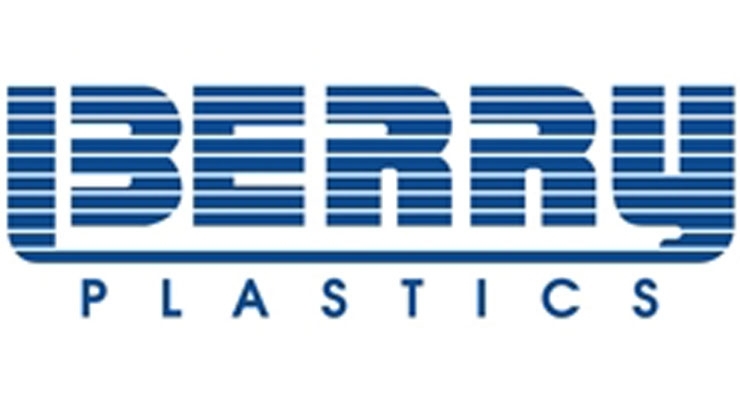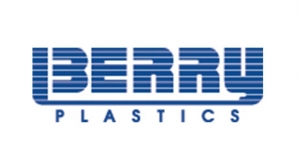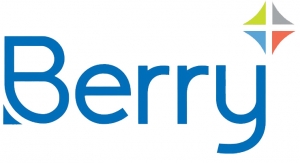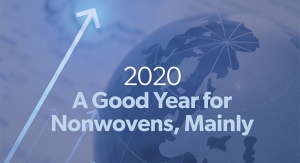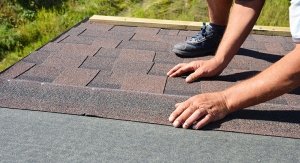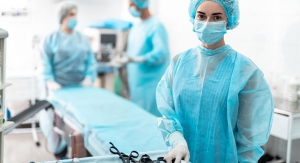09.11.17
Evansville, IL
www.berryglobal.com
2017 Nonwovens Sales: $2.3 billion
Key Personnel
Tom Salmon, CEO; Scott Tracey, president, Health, Hygiene and Specialties Division
Plants
North America: Benson, NC; Dalton, GA; McAlester, OK; Mooresville, NC; Naucalpan, Mexico; North Bay, Canada; Old Hickory, TN; Pewarukee, WI; San Lui Potosi, Mexico; Schaumberg, IL; Statesville, NC; Tlalnepantla, Mexico; Washington, GA; Waynesboro, VA. South America: Cali, Colombia; Pilar, Argentina; Pouso Alegre, Brazil; Sao Jose dos Pinhais, Brazil. EMEIA: Aberdare, U.K.; Bailleul, France; Bengaluru, India; Berlin, Germany; Biesheim, France; Cujik, Netherlands; Maldon, U.K.; Mundra, India; Neuville-en-Ferrain, France; Offranville, France; Sandskanaal, Netherlands; Tarragona, Spain; Terno d’Isola, Italy. Asia:
Processes
Spunbond, meltblown, SMS, carded, composites, through air bonded, adhesive bonded, resin bonded, thermal bonded, spunlace, airlaid, aperture film, film laminates, sonic laminates, extruded laminates, thermal laminates, Apex, Spinlace and other proprietary fabric forming, surfacing and binding systems, nonwoven and film printing, multi-layer blown film extrusion, cast film extrusion and injection molding
With a new acquisition in the films segment under its belt, Berry Global continues to focus not just on being the world’s largest manufacturer of nonwovens—a title it has held since 2016—but also the most comprehensive supplier to the hygiene market in the world.
In November 2017, Berry announced it would acquire Clopay Plastic Products, a technology leader in the breathable films segment for $475 million in cash.
“Nonwovens and films are both components of hygiene items and Clopay is a logical acquisition as we look to bring end-to-end solutions to our customers,” says executive vice president of global communications and marketing David Park. “Clopay’s Sof-Flex ultra lightweight films can perform well on high-speed hygiene assets. If we combine this technology with our nonwovens technology, we can offer complete solutions for baby diapers.”
With annual sales of $461 million, Clopay operated facilities in Kentucky, Tennessee, Germany, Brazil and China, and shares many customers with Berry in the hygiene segment. Its largest customer—Procter & Gamble—represented about half of its sales last year. In 2016, the company spent $50 million to expand its breathable film capacity in North America, Europe and Brazil, responding to demand for Sof-Flex.
The integration of Clopay’s technology into Berry’s product portfolio, which already contained film products for hygiene applications, has allowed the company to reach customer needs for softness, strength and loft globally. Clopay’s backsheet films can be combined with nonwovens or offered as a laminate and the company’s technology also brings elastic film technology into the Berry portfolio. Particularly in feminine hygiene, the combination of films and nonwovens offer complete and discreet product solutions.
Berry is no stranger to acquisition. The company entered the nonwovens industry by acquiring the world’s largest producer, Avintiv, in 2014. Prior to the acquisition, Avintiv had also used acquisition as a key growth strategy, purchasing spunmelt assets in Brazil and Europe as well as more technical-oriented operations in the U.S. and Europe.
Acquisition is not the only growth vehicle for Berry. The company continues to invest across its many nonwovens technology platforms and is currently adding a spunmelt line in Nanhai, China, and a Spinlace wipes substrate line in Mooresville, NC.
In 2018, Berry confirmed that its latest spunmelt investment, a 20,000-ton Reicofil 5 spunmelt line, which was announced in mid 2017, would be located at Nanhai, China. The new line will target the Asia-Pacific markets with specialty, soft products for hygiene applications. The R5 technology was selected because of its cost effectiveness and its ability to complement Berry’s existing soft applications.
“The Asia-Pacific market sets the bar very high for softness,” says vice president of Berry’s Asia-Pacific operations Johnny Wang. “Our technology, combined with the latest Reifenhauser technology, can bring a full range of softness—whether it’s the silky softness preferred in Japan or the high loft softness popular in China. We can offer a complete range of softness. We are not just meeting one region’s definition of softness.”
The Nanhai site was built in 2014 to replace an older site originally built there in 1996.
Other recent Chinese investments include the addition of meltblown capabilities to an existing line in Suzhou, China. Both investments expanded Berry’s role in the hygiene, medical and healthcare markets.
Suzhou is not Berry’s first investment in soft technology. In 2015, the company invested in carding technology in Terno d’Isola, Italy, and increased its spunmelt nonwovens capacity, allowing for higher loft products, as part of a significant European investment that brought capacity in the region to above 100,000 metric tons. In fact, the company’s Terno d’Isola, Italy, site is now a Center of Excellence for carded nonwovens, featuring an enhanced production process and innovation capabilities that have allowed it to respond to changing market demands. The new and upgraded lines in Terno d’Isola can produce all basis weights for air-through bonded carded nonwovens with both mono and multi-layers.
Also included in the upgrade is a new automatic high speed spooling machine with 10 winding heads to satisfy any customer need in processing.
Meanwhile, Berry’s new Spinlace production line in Mooresville, NC, will feature its advanced proprietary process to hydroentangle limitless materials, and will provide an incremental 17,000 metric tons of annual capacity serving the North American markets. This investment will meet market and customer growth in healthcare, hygiene, household cleaning, foodservice and industrial wipes markets and is Berry’s third line featuring the technology. Berry introduced the technology in 2007 and added a second line in 2014.
“Unique in the market, this technology provides strength, bulk, a high degree of design flexibility, as well as three-dimensional imaging capabilities for texture and branding,” says Scott Tracey, president of Berry’s Health, Hygiene, and Specialties Division.
“By combining Spinlace with Berry’s proprietary Apex technology we can impart customizable three-dimensional images directly into the fabric, providing enhanced product performance, recognition and/or aesthetic appeal with brand differentiation.”
The new line will allow Berry to make wipes for a full range of surface wipes. It is expected to be complete in mid-2019.
Outside of wipes and hygiene, Berry operates a sizable specialty business globally with key markets including agriculture, specialty filtration, building and construction and geotextiles. In November, the company showed an increased focus on its agriculture business when it designated its facility in Beisheim, France as a European Center of Excellence in agriculture.
To achieve this designation, Biesheim’s technical capacities were upgraded with the addition of a welding line and improvements designed to increase its capacity for wide-width materials. Additionally, further improvements will be made to allow the Beisheim site to continually advance its processes and the service and product quality it provides to its customers.
According to the company, the division will establish the Centers of Excellence for strategic markets and core technologies around the world demonstrating its focus on providing the highest quality products and services to its customers.
“The reality is we go where our customers need us to go,” Parks says. “We are well placed around the world but we are always asking how do we further penetrate markets.”
www.berryglobal.com
2017 Nonwovens Sales: $2.3 billion
Key Personnel
Tom Salmon, CEO; Scott Tracey, president, Health, Hygiene and Specialties Division
Plants
North America: Benson, NC; Dalton, GA; McAlester, OK; Mooresville, NC; Naucalpan, Mexico; North Bay, Canada; Old Hickory, TN; Pewarukee, WI; San Lui Potosi, Mexico; Schaumberg, IL; Statesville, NC; Tlalnepantla, Mexico; Washington, GA; Waynesboro, VA. South America: Cali, Colombia; Pilar, Argentina; Pouso Alegre, Brazil; Sao Jose dos Pinhais, Brazil. EMEIA: Aberdare, U.K.; Bailleul, France; Bengaluru, India; Berlin, Germany; Biesheim, France; Cujik, Netherlands; Maldon, U.K.; Mundra, India; Neuville-en-Ferrain, France; Offranville, France; Sandskanaal, Netherlands; Tarragona, Spain; Terno d’Isola, Italy. Asia:
Processes
Spunbond, meltblown, SMS, carded, composites, through air bonded, adhesive bonded, resin bonded, thermal bonded, spunlace, airlaid, aperture film, film laminates, sonic laminates, extruded laminates, thermal laminates, Apex, Spinlace and other proprietary fabric forming, surfacing and binding systems, nonwoven and film printing, multi-layer blown film extrusion, cast film extrusion and injection molding
With a new acquisition in the films segment under its belt, Berry Global continues to focus not just on being the world’s largest manufacturer of nonwovens—a title it has held since 2016—but also the most comprehensive supplier to the hygiene market in the world.
In November 2017, Berry announced it would acquire Clopay Plastic Products, a technology leader in the breathable films segment for $475 million in cash.
“Nonwovens and films are both components of hygiene items and Clopay is a logical acquisition as we look to bring end-to-end solutions to our customers,” says executive vice president of global communications and marketing David Park. “Clopay’s Sof-Flex ultra lightweight films can perform well on high-speed hygiene assets. If we combine this technology with our nonwovens technology, we can offer complete solutions for baby diapers.”
With annual sales of $461 million, Clopay operated facilities in Kentucky, Tennessee, Germany, Brazil and China, and shares many customers with Berry in the hygiene segment. Its largest customer—Procter & Gamble—represented about half of its sales last year. In 2016, the company spent $50 million to expand its breathable film capacity in North America, Europe and Brazil, responding to demand for Sof-Flex.
The integration of Clopay’s technology into Berry’s product portfolio, which already contained film products for hygiene applications, has allowed the company to reach customer needs for softness, strength and loft globally. Clopay’s backsheet films can be combined with nonwovens or offered as a laminate and the company’s technology also brings elastic film technology into the Berry portfolio. Particularly in feminine hygiene, the combination of films and nonwovens offer complete and discreet product solutions.
Berry is no stranger to acquisition. The company entered the nonwovens industry by acquiring the world’s largest producer, Avintiv, in 2014. Prior to the acquisition, Avintiv had also used acquisition as a key growth strategy, purchasing spunmelt assets in Brazil and Europe as well as more technical-oriented operations in the U.S. and Europe.
Acquisition is not the only growth vehicle for Berry. The company continues to invest across its many nonwovens technology platforms and is currently adding a spunmelt line in Nanhai, China, and a Spinlace wipes substrate line in Mooresville, NC.
In 2018, Berry confirmed that its latest spunmelt investment, a 20,000-ton Reicofil 5 spunmelt line, which was announced in mid 2017, would be located at Nanhai, China. The new line will target the Asia-Pacific markets with specialty, soft products for hygiene applications. The R5 technology was selected because of its cost effectiveness and its ability to complement Berry’s existing soft applications.
“The Asia-Pacific market sets the bar very high for softness,” says vice president of Berry’s Asia-Pacific operations Johnny Wang. “Our technology, combined with the latest Reifenhauser technology, can bring a full range of softness—whether it’s the silky softness preferred in Japan or the high loft softness popular in China. We can offer a complete range of softness. We are not just meeting one region’s definition of softness.”
The Nanhai site was built in 2014 to replace an older site originally built there in 1996.
Other recent Chinese investments include the addition of meltblown capabilities to an existing line in Suzhou, China. Both investments expanded Berry’s role in the hygiene, medical and healthcare markets.
Suzhou is not Berry’s first investment in soft technology. In 2015, the company invested in carding technology in Terno d’Isola, Italy, and increased its spunmelt nonwovens capacity, allowing for higher loft products, as part of a significant European investment that brought capacity in the region to above 100,000 metric tons. In fact, the company’s Terno d’Isola, Italy, site is now a Center of Excellence for carded nonwovens, featuring an enhanced production process and innovation capabilities that have allowed it to respond to changing market demands. The new and upgraded lines in Terno d’Isola can produce all basis weights for air-through bonded carded nonwovens with both mono and multi-layers.
Also included in the upgrade is a new automatic high speed spooling machine with 10 winding heads to satisfy any customer need in processing.
Meanwhile, Berry’s new Spinlace production line in Mooresville, NC, will feature its advanced proprietary process to hydroentangle limitless materials, and will provide an incremental 17,000 metric tons of annual capacity serving the North American markets. This investment will meet market and customer growth in healthcare, hygiene, household cleaning, foodservice and industrial wipes markets and is Berry’s third line featuring the technology. Berry introduced the technology in 2007 and added a second line in 2014.
“Unique in the market, this technology provides strength, bulk, a high degree of design flexibility, as well as three-dimensional imaging capabilities for texture and branding,” says Scott Tracey, president of Berry’s Health, Hygiene, and Specialties Division.
“By combining Spinlace with Berry’s proprietary Apex technology we can impart customizable three-dimensional images directly into the fabric, providing enhanced product performance, recognition and/or aesthetic appeal with brand differentiation.”
The new line will allow Berry to make wipes for a full range of surface wipes. It is expected to be complete in mid-2019.
Outside of wipes and hygiene, Berry operates a sizable specialty business globally with key markets including agriculture, specialty filtration, building and construction and geotextiles. In November, the company showed an increased focus on its agriculture business when it designated its facility in Beisheim, France as a European Center of Excellence in agriculture.
To achieve this designation, Biesheim’s technical capacities were upgraded with the addition of a welding line and improvements designed to increase its capacity for wide-width materials. Additionally, further improvements will be made to allow the Beisheim site to continually advance its processes and the service and product quality it provides to its customers.
According to the company, the division will establish the Centers of Excellence for strategic markets and core technologies around the world demonstrating its focus on providing the highest quality products and services to its customers.
“The reality is we go where our customers need us to go,” Parks says. “We are well placed around the world but we are always asking how do we further penetrate markets.”

